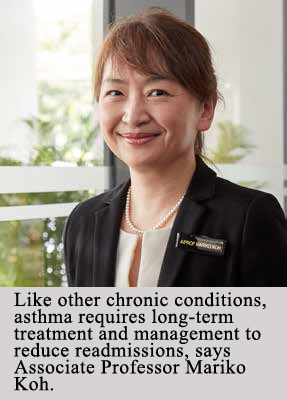Under the A-CARE programme, Senior Staff Nurse Jenneth Leow provides asthma counselling and education on inhaler use to patients like Ms Katrina Tan (right), who was unaware of the severity of her symptoms until she was admitted to SGH’s ED in 2019 for a severe asthma attack.
A pilot programme, which incorporated asthma counselling into the patient journey at the Emergency Department, brought about improved asthma management and outcomes.
When patients do not understand their asthma or how to care for their condition, they find themselves seeking treatment — often repeatedly — at the emergency departments (ED) for severe symptoms, such as breathlessness and chest tightness.
Severe asthma attacks can be life-threatening. Of 376 patients with life-threatening asthma who were admitted to the intensive care units of four restructured hospitals, 47 died during admission, a 2011-2015 study found. Severe asthma attacks also tend to occur at night, when temperatures drop.
To reduce ED visits and hospital admissions, an asthma specialist nurse has been included in Singapore General Hospital’s (SGH) ED night team under a pilot programme called Asthma-COPD (chronic obstructive pulmonary disease) Afterhours Respiratory Nurse at Emergency, or A-CARE.
“When patients come to the ED with an acute asthma attack, the ED physician performs initial treatment. When their condition stabilises, they are transferred to the short-stay unit for up to 23 hours. That is when the A-CARE nurse comes into the picture,” said Dr Kenneth Tan, Head and Senior Consultant, Department of Emergency Medicine, SGH.
Asthma nurses have been part of SGH’s ED team for over 10 years, but this is the first time that one has been placed on night duty. Asthma nurses provide important clinical support to ED doctors, assessing patients’ overall conditions, recommending inhalers, and arranging postdischarge follow-up.
 Like other chronic medical conditions, asthma requires regular and long-term treatment and management, said Associate Professor Mariko Koh, Senior Consultant, Department of Respiratory and Critical Care Medicine, SGH.
Like other chronic medical conditions, asthma requires regular and long-term treatment and management, said Associate Professor Mariko Koh, Senior Consultant, Department of Respiratory and Critical Care Medicine, SGH.
“Patients do not realise that asthma, like diabetes and high blood pressure, is a chronic condition that requires long-term care,” said Prof Koh, adding that regular outpatient follow-up and management can help cut down on readmissions as patients’ asthma stabilises.
Long-term asthma therapy involves controlling inflammation with inhaled corticosteroids (ICS), which are used daily; oral corticosteroids (OCS) and Short-Acting Beta-Agonists (SABAs) inhalers — commonly known as ‘blue puffs’ — for temporary relief of symptoms.
Overuse of the blue puffs, which open up the airway, can be dangerous.
“Patients either do not have an inhaler, or they only have a SABA inhaler, which should only be used for relieving acute symptoms. Some have both ICS and a blue puff, but do not know how and when to use them,” said Ms Jenneth Leow, Senior Staff Nurse, SGH, who works three nights a week at the ED under the A-CARE programme.
The 17-month A-CARE pilot, which ran between September 2016 and February 2018 and involved 300 patients, saw more asthma patients started on long-term ICS inhalers (from 30 per cent to 70 per cent). Patients under Ms Leow’s care were also more likely to stick to their appointments with respiratory specialists (from 15 per cent to 40 per cent).
“The A-CARE nurses are a great help to ED physicians. While we attend to other life-threatening cases, they speak to asthma patients under observation and make recommendations that facilitate our decision-making,” Dr Tan said.
SGH, which collaborated with global biopharmaceutical company AstraZeneca on A-CARE, hopes to begin training other ED nurses to ensure round-the-clock asthma counselling at the ED. Depending on the COVID-19 pandemic situation, phase 2 of the initiative could start in 2021.
Tags:
;
;
;
;
News Article;
;
Singapore General Hospital;
Article;
Singapore Health;
;
;
;
;
Singapore Health
